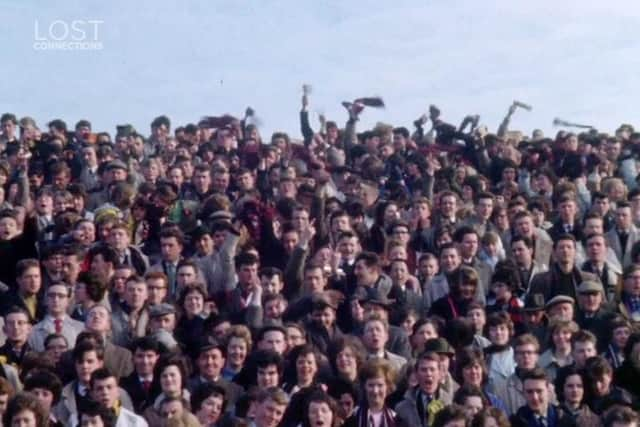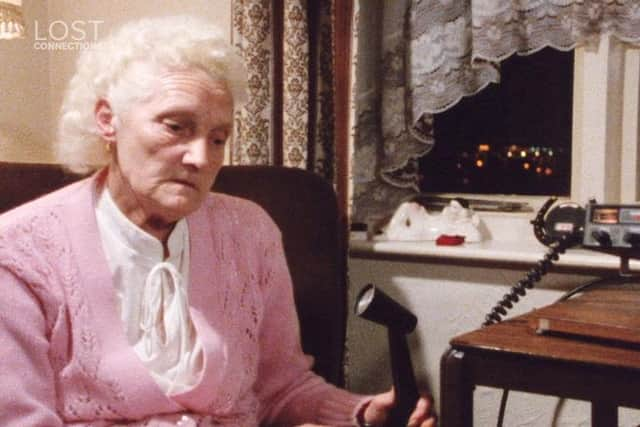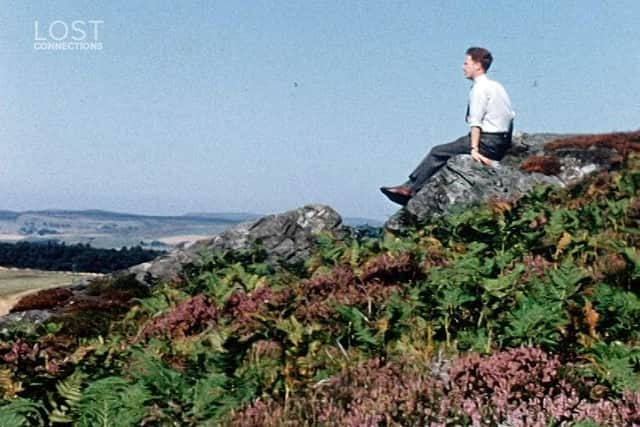Yorkshire Film Archive leads collaborative short film project Lost Connections about 'what really matters'
In the past few months, after a strange and challenging year and a half, we have all been gradually re-establishing connections with family, friends and loved ones.
That experience of reconnection after a period apart is explored in a new archive-based short film, Lost Connections, the result of a creative collaboration led by the Yorkshire Film Archive (YFA) working together with the moving image archives of Wales, Scotland, Northern Ireland and the nine English regional film archives.
Advertisement
Hide AdAdvertisement
Hide AdThe 13-minute film was supported by Film Hub North and compiled by Andy Burns, an editor and filmmaker at the YFA, from clips and extracts from hundreds of films put forward by archive curators on film, video and digital formats.


“When we got the funding from Film Hub North, we thought we wanted to do something about the extraordinary times we have been living through,” says YFA archive manager Graham Relton, who also produced the film.
“We were thinking along the lines of communication and how people have kept in touch and the idea of looking into the vaults of our collections to find films and extracts that spoke to those feelings of loss and isolation. It is the first time that all the regional archives have worked together on a project like this, so it is unique.”
The archives were all invited to submit material on certain themes including loss, loneliness, isolation, the importance of community, family, nature and human touch. And the response was overwhelming.


Advertisement
Hide AdAdvertisement
Hide AdRelton and Burns then issued a second call-out for films about everyday life, consumerism and the fast pace of the modern world as a contrast and a way of pointing out what really matters, as our recent experience has highlighted.
“Lockdown was a time to reflect and question and what we found to be important was not material things but rather spending time with family, going for a walk in the park, or a hug or keeping in contact with a friend,” says Relton.
“There was that contrast between isolation and connection, light and dark, that came through in the films. Andy was able to draw those themes together, with the images and voices from the collections, to build a narrative.”
At this point, writer and artist Hussina Raja was brought on board. Raja narrates the film from a script, co-written with Burns, based on her own responses to the imagery; these include two recurring phrases “can we always be connected?” and “can we depend on each other?” which establish a common thread reaching back into the past, connecting with the present and projecting into the future.


Advertisement
Hide AdAdvertisement
Hide AdThe result is a very moving, lyrical cine-poem. “We needed a connecting voice to draw all the material together,” says Relton.
“Hussina was such an important part of the process – she was absolutely brilliant at bringing that universal reflection on the footage. We are hoping the film will appeal to a whole host of people but particularly young people who may think that archive film is not for them.”
To this end, the film is being screened in schools across the UK as part of a Mental Health and Wellbeing campaign by the Into Film charity. It will also be shown in cinemas and community hubs as well as being accessible online.
Out of the 500 clips submitted, around 200 were eventually used in the final film. It took around two months to complete. “It is quite intense going through that amount of footage, so we would have a bit of a break, get some feedback and then come back to it,” says Burns.
Advertisement
Hide AdAdvertisement
Hide Ad“Piecing the extracts together was like writing a story. We wanted lots of different voices, accents and regions, people from diverse ethnicities and backgrounds to make it as inclusive as possible. Some of the audio clips were commentary, some were more in-depth, personal and reflective. Then we layered Hussina’s responses on top. I compare it to a paint box – you have all these different colours and a palette – it is something quite different.”
Relton adds: “We wanted it to be a really representative piece that questions where we have been and where we are going.”
The film skilfully combines the present with the past, the contemporary with the historical to create a picture of shared humanity. It is very affecting. Busy shopping streets of the 1970s, showing packed department stores and eager shoppers, blend into black and white footage of human and motorised traffic flowing through city centres.
Seaside holidays, lively dance floors and crowded concert halls are then contrasted with footage of empty playgrounds, classrooms, offices and NHS hospitals facing difficulties due to a lack of funding.
Advertisement
Hide AdAdvertisement
Hide AdAudio clips talk of struggles with loneliness, isolation and depression, feelings of being “detached from the everyday”. There is uplifting imagery of people communing with nature – walking in the hills, caving, picnicking, sea-swimming – and with each other. Family celebrations such as birthdays and weddings feature, as do community events like street parties and nights out in the pub. There are close-ups of hugs, kisses and entwined hands.
“I see the film as being part of the start of our recovery post-Covid,” says Burns.
“It is reflecting on how people have felt in the past and how that can help us to move forward. We had a curatorial group of six and everyone was so supportive – we all had a similar vision. And I am so pleased it has had such a good reception so far. I like to think of it as being a message of hope. People have said that it has made them think about what is really important – family, friends, community and the environment.”
While Lost Connections is a poetic response to the pandemic, it is not about the pandemic; the film reveals our common experiences over the generations. We are not the first people to live through such challenging events or to feel such emotions which is, in many ways, both reassuring and sustaining, offering hope for the future. Recovery and renewal are significant, repeating tropes.
Advertisement
Hide AdAdvertisement
Hide AdThe film ends, poignantly, with Hussina Raja’s powerful words ‘to nurture, protect and treasure one another; a new way for the new day”.
“It’s been a labour of love but also we were conscious that we didn’t want it to be a party-political broadcast,” says Relton. “The film is a conversation starter. It is about asking the question ‘what do you value?’ and I think we have all discovered during the course of the pandemic that it is the simple things that tend to make us happy. T
he film is finished, but I think the people who watch it and respond to it will add another layer to it. It might take the past as its reference point, but Lost Connections speaks to our collective responsibility to build better futures.”
Lost Connections is available to view via the Yorkshire Film Archive website https://www.yfanefa.com/
Comment Guidelines
National World encourages reader discussion on our stories. User feedback, insights and back-and-forth exchanges add a rich layer of context to reporting. Please review our Community Guidelines before commenting.
